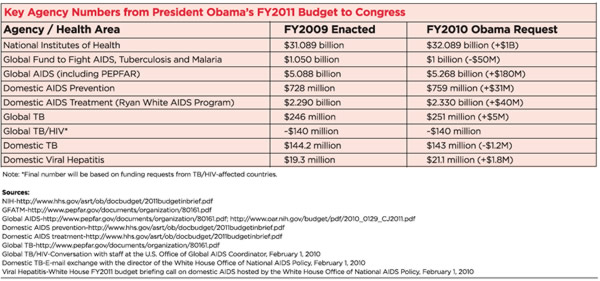By Coco Jervis and Sue Perez
Negligible Increases for AIDS, TB, Viral Hepatitis Treatment and Research
On Monday, February 1, 2010, President Barack Obama unveiled his fiscal year (FY) 2011 budget to the U.S. Congress. Global health programs were allocated $8.513 billion, a 9.4% increase over the FY2010 final funding level, yet the percent increase for global AIDS, domestic HIV prevention and domestic AIDS treatment programs received small increases of 3.5%, 4.25% and 1.7% respectively.
Domestic HIV prevention programs got a slight boost of $31 million and the critical Ryan White HIV/AIDS Treatment Program was allocated a mere additional $40 million. These minor increases signal disappointingly weak support for expanding prevention and treatment programs to control the domestic HIV epidemic.
Global tuberculosis (TB) programs received a paltry 2% increase of $5 million over the 2010 level. New monies for TB and HIV push the level of funding for TB and for TB-HIV coinfection to approximately $390 million, which is less than half of the $800 million authorized annually for global TB by Congress over the current five years of the U.S. President’s Emergency Plan for AIDS Relief (PEPFAR).
The allocation for the Global Fund to Fight AIDS, Tuberculosis and Malaria, a vital funder of global AIDS, TB and malaria programs, was cut by $50 million. This is a distressing omen that the Obama administration is backing away from its commitment to support developing countries to reach universal access to prevention, treatment
and care for the three diseases.
The Global Fund faces a multi-billion dollar gap and has been unable to fully fund all sound proposals submitted. The result will be counted in lives lost—existing HIV programs do not have enough money to enroll new patients who urgently require antiretroviral treatment and existing patients are experiencing treatment interruptions. Progress to increase the numbers of people tested for HIV is being threatened because people are hearing that treatment is not available, and the newly diagnosed or newly ill have no place to receive appropriate care.
Funding for domestic TB programs received a disappointing decrease of $1.2 million, and domestic viral hepatitis programs received an abysmal increase of $1.8 million (less than 1%) for FY2011. More than four million Americans live with chronic viral hepatitis, and there is no cure for hepatitis B.

